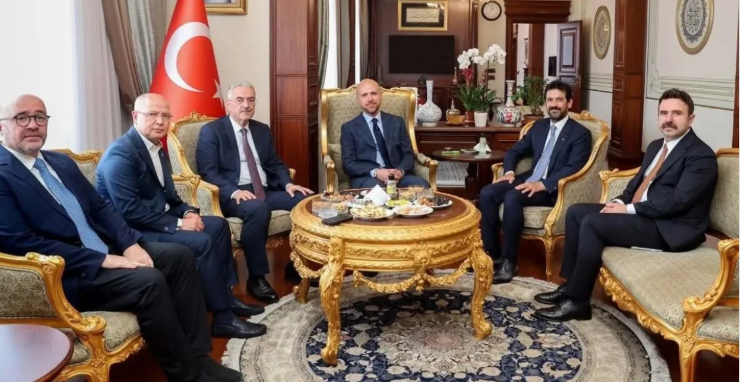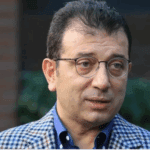Right after the May 2023 runoff, we argued that Erdoğan’s third term would be defined by succession—not competition. He would keep a tight grip on power—“as long as his health permits”—while grooming a handpicked heir, likely from within the family, to carry the project into 2028 (or earlier). We also warned that legal and political manoeuvres—especially against opposition figures and would-be presidential candidates—would be used to smooth the handoff. We said it then; we stand by it now: for Erdoğan to install an heir—and for that heir to sustain power—the transition must occur while he is still physically able and at peak influence inside the party.
Since then, our hypothesis has steadily materialized—most clearly from early 2025—in Bilal Erdoğan’s front-and-center role at Gaza rallies and in an AKP reshuffle that channels power to younger loyalists, widely read as clearing the path for his succession. The trend predates 2025 but accelerated this year: AKP headquarters has forced out or reassigned several dozen local leaders. For instance, in the last three days, AKP announced that eight provincial chairmen resigned or were replaced—in Muğla, Çanakkale, Adıyaman, Niğde, Tunceli, Bitlis, Elazığ and Ordu – “because our work in those cities fell below the expected level.” Party insiders explained this was a planned “görev değişikliği” (duty reshuffle) after the latest congress to “take our political presence to the highest level”. In practice, it has meant centralizing appointments: provincial chairs are now handpicked by the General Headquarters rather than elected at congresses. Symbolic displays have reinforced this trend. In August 2025, Turkish media ran photos of Bilal Erdoğan visiting Bursa during the July forest fires, sitting down in Governor Ayyıldız’s chair – a striking image of Erdoğan’s son in a position of official authority. All of these signals – mass resignations, centrally appointed replacements and public photo-ops – point to an AKP leadership glued together from the top.
Emerging Young Loyalists
At the same time, the AKP has elevated a new generation of officials loyal to the Erdoğan family. Longtime party technocrats have given way to energetic 30-somethings. In February 2025, Erkan Kandemir (a generation older) handed the AKP organizational presidency to Ahmet Büyükgümüş (born in 1990). The party explained that Büyükgümüş – a former youth-wing leader – is “one of AKP’s young, shining values”. Soon after, Abdullah Özdemir (born 1983) – Bağcılar Mayor after ‘resigning’ from his post – was selected as Istanbul Provincial Chairman at the 8th Istanbul Congress on February 7, 2025. Also in February, the party tapped Eyüp Kadir İnan (born 1993) as its new General Secretary, displacing veteran Fatih Şahin. Party sources touted İnan’s appointment as proof of “one of our promising young cadres” (lit. “one of our young values”)” under Erdoğan.
These rising officials all have close ties to Erdoğan’s son Bilal. In fact, opposition media reported that Bilal Erdoğan’s networks dominate the new ranks. At the Istanbul congress where Özdemir was elected, OdaTV noted that the candidate lists were dominated by leaders from Bilal-linked foundations (the Okçular Foundation, TÜGVA and TÜRGEV). The article observed that “stamped by Bilal Erdoğan,” the Istanbul party list – many new leaders came from the religious–nationalist circles allied with Bilal.
Moreover, after the 8th Grand Congress, the AKP named a refreshed MYK (Executive Board) that both centralizes control and skews younger. Roughly one-third of the Executive Board are newcomers, and several of those additions come from the 1980s–1990s cohort. About a third of the MYK now sit in the under-45 bracket.
In short, the AKP’s leadership is getting younger and more homogeneously pro-Bilal. Veterans like former Organization Chief Kandemir and others have been sidelined or simply not included in the new lists (even allegedly “deactivated” by Bilal’s camp). The net effect is a party apparatus reshaped around Erdoğan’s family circle and their protégés, and this trend of youth and loyalty is expected to continue in the coming months and years.
Erdoğan’s “Last Campaign” Is His Son’s First
This groomed generation rises at a politically charged moment. In late May 2025, President Erdoğan shocked many by announcing he would not run for another term. Returning from a Budapest summit, he told reporters: “I have no intention of running again or seeking re-election.” He framed this as selfless, even as he praised the need for a new constitution “not for us but for the country,” and extended an olive branch to the opposition CHP to join the process.
In effect, Erdoğan signalled a managed transition: he would remain the de facto leader as the chief of the AKP and implement institutional changes, rather than stepping away until he could hand the party leadership to his son Bilal. As noted previously, Erdoğan’s real goal has been to groom and prepare his son to succeed him, even setting the stage for a family dynasty by filling key posts with loyalists. In this light, Erdoğan’s talk of constitutional reform and stepping aside from candidacy can be seen as laying groundwork: crafting rules (a new constitution, election law changes, even early elections) that will cement his family’s hold on power without him on the ballot. Indeed, our predictions and analyses from May 2023 foresaw that Erdoğan’s third term would focus on dynastic succession.
Authoritarian Maneuvers and Undercutting the Opposition
Erdoğan isn’t just redesigning his party; he’s shaping the opposition—including the MHP—to clear the way for his son, virtually charisma-free and politically ineffectual, to take power and keep it. To that end, since the staged coup attempt of summer 2016, the Erdoğan presidency has tightened the screws on dissent, making clear that the youth takeover is unfolding under his son within a broader authoritarian consolidation. His influence is now extending well beyond the AKP. In the opposition CHP, the courts have been enlisted to reshape leadership and neutralize rivals.
Since the 2024 local elections, dozens of opposition officials have been purged. In one high-profile case, an Istanbul court recently intervened in CHP internal affairs: a court on September 2, 2025, annulled the CHP Istanbul provincial congress, removed the elected chairman Özgür Çelik, and imposed a “kayyum” board of five (notably, including former CHP leader Gürsel Tekin) to run the party’s Istanbul branch. CHP leaders condemned this unprecedented state interference in an opposition party as illegitimate.
Even Turkey’s most popular opposition mayor has not been spared. Long-serving Istanbul Mayor Ekrem İmamoğlu (CHP) was removed from office and subsequently arrested last March and later banned from politics in a massive raid on CHP officials – an operation his party calls purely political. (He remains jailed in Silivri prison.) İmamoğlu now faces multiple trials on several charges. In this atmosphere – where trustees are installed over elected city halls, party assemblies are shut down, and political rivals are jailed – the AKP’s youthful makeover looks like part of a strongman playbook rather than open competition.
Even Erdoğan’s longtime coalition partner, the nationalist MHP, is being swept into this calculus. The MHP’s 77-year-old leader, Devlet Bahçeli, has been a loyal ally, but observers see strained ties. In practice, as we noted earlier, Erdoğan’s dynastic push may soon sideline much of Bahçeli’s inner circle. Erdoğan is applying the same authoritarian techniques used on political rivals to even the MHP’s own networks, effectively depoliticizing anyone who might resist Bilal’s rise. The regime appears to be aligning more controllable figures in the nationalist camp.
Youth as Succession Strategy?
Taken together, these trends suggest that AKP’s “youthification” is a strategic choice to build a pliant structure around Bilal Erdoğan. Every recent hire or promotion – from Büyükgümüş to Özdemir to İnan – has been someone who came up through AKP’s youth networks or Erdoğan-friendly NGOs. Bilal Erdoğan himself has, for years, run multiple educational foundations (TÜRGEV, TÜGVA, etc.) that critics say serve as recruitment pipelines for government jobs. In other words, AKP’s generational handover isn’t happening organically through elections – it’s being engineered from above. The Erdoğan family appears to treat 82 million citizens as their subjects and the assets of the country as their wealth, aiming for long-lasting rule reminiscent of a dynastic system. The AKP youth around Bilal are explicitly raised to be loyal foot-soldiers, not independent leaders.
That reality undercuts the party’s public rhetoric about renewal. AKP officials insist the new generation will simply bring fresh energy, but opponents and observers see a clear succession plan. The key risk is that Turkey’s ruling party will become even more personalistic and brittle. If leadership shifts from competitive elections or party primaries to within a family network, institutional accountability will disappear entirely. It also raises the prospect that Erdoğan’s critics – both inside AKP and out – have no real pathway for influence. As we have cautioned, this “managed transition” model dangerously concentrates power. In effect, Turkey is being—if it hasn’t already been—steered away from competitive autocracy toward a dynastic autocracy.
By: News About Turkey (NAT)



